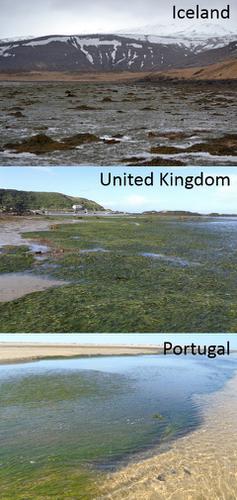当前位置:
X-MOL 学术
›
Funct. Ecol.
›
论文详情
Our official English website, www.x-mol.net, welcomes your
feedback! (Note: you will need to create a separate account there.)
Ocean warming increases the nitrogen demand and the uptake of organic nitrogen of the globally distributed seagrass Zostera marina
Functional Ecology ( IF 4.6 ) Pub Date : 2020-06-02 , DOI: 10.1111/1365-2435.13576 Ana Alexandre 1 , Raquel Quintã 2 , Paul W. Hill 3 , Davey L. Jones 3, 4 , Rui Santos 1
中文翻译:

海洋变暖增加了全球分布的海草Zostera码头的氮需求和对有机氮的吸收
更新日期:2020-06-02
Functional Ecology ( IF 4.6 ) Pub Date : 2020-06-02 , DOI: 10.1111/1365-2435.13576 Ana Alexandre 1 , Raquel Quintã 2 , Paul W. Hill 3 , Davey L. Jones 3, 4 , Rui Santos 1
Affiliation

|
- The impact of global warming on the metabolic state of a species may be examined by either measuring physiological rates across a latitudinal gradient or by assessing short‐term responses under experimentally controlled temperature regimes. The combination of the two approaches is seldom used but it provides valuable information on an organism's responses to temperature at broader temporal and spatial scales while allowing the isolation of temperature effects from other environmental variables.
- Here we used both approaches to assess the warming effects on the total acquisition of dissolved inorganic nitrogen (DIN; nitrate, ammonium) and organic N (DON; amino acids, peptides) by the globally widespread seagrass Zostera marina. DIN and DON uptake rates were measured in plants from three sites covering the species latitudinal distribution in Europe (Iceland, UK and Portugal). The responses of DIN and DON uptake rates of plants from the middle latitude (UK) to a latitudinal range of temperatures (8, 12 and 17°C) were also measured. We further examined the microbial uptake of DON along the latitudinal distribution and whether temperature is the main driver of that uptake.
- Our results showed that warming greatly increased the total N uptake by Z. marina and also the relative contribution of DON to total N acquisition. The microbial uptake of DON increased towards warmer latitudes, and temperature was the main driver of these observations.
- Ocean warming will increase the nitrogen demand of Z. marina and this demand may be met by an increasing uptake of organic nitrogen forms. This indicates that Z. marina, and probably other seagrass species, can be winners under global change as nitrogen uptake capacity will not limit growth driven by increased photosynthetic assimilation of CO2.
中文翻译:

海洋变暖增加了全球分布的海草Zostera码头的氮需求和对有机氮的吸收
- 可以通过测量跨纬度梯度的生理速率或通过在实验控制的温度机制下评估短期响应来检查全球变暖对物种代谢状态的影响。很少使用这两种方法的组合,但是它提供了有关生物体在更宽的时间和空间范围内对温度响应的有价值的信息,同时允许将温度影响与其他环境变量区分开。
- 在这里,我们使用这两种方法来评估全球范围内广泛分布的海草Zostera滨海地区对溶解无机氮(DIN;硝酸盐,铵)和有机N(DON;氨基酸,肽)的总获取所产生的升温效应。从欧洲(冰岛,英国和葡萄牙)的三个纬度物种分布的三个地点的植物中测量了DIN和DON的吸收率。还测量了植物从中纬度(英国)到纬度温度范围(8、12和17°C)的DIN和DON吸收速率的响应。我们进一步研究了微生物对DON沿纬度分布的吸收,以及温度是否是该吸收的主要驱动因素。
- 我们的结果表明,变暖极大地增加了滨海沼虾的总氮吸收量,也增加了呕吐毒素对总氮吸收量的相对贡献。DON的微生物吸收随着纬度的升高而增加,温度是这些观察结果的主要驱动力。
- 海洋变暖将增加滨海沼虾的氮需求,并且可以通过增加对有机氮的吸收来满足这一需求。这表明在全球变化下,滨海假单胞菌以及其他海草物种可能是赢家,因为氮的吸收能力不会限制由于光合作用增加的CO 2吸收而导致的生长。











































 京公网安备 11010802027423号
京公网安备 11010802027423号